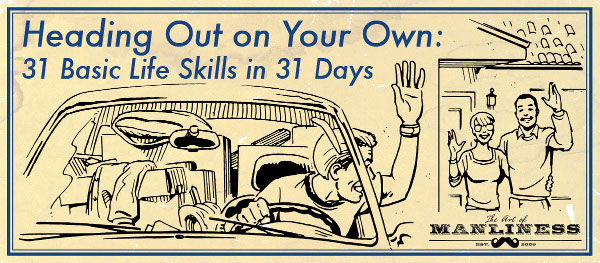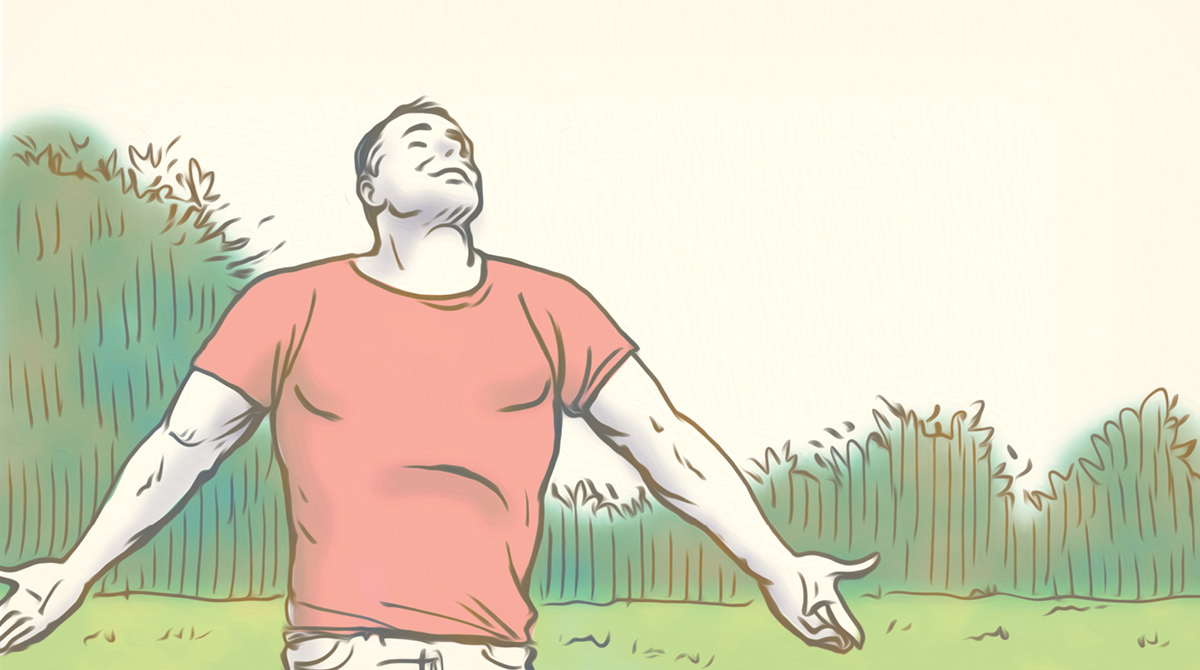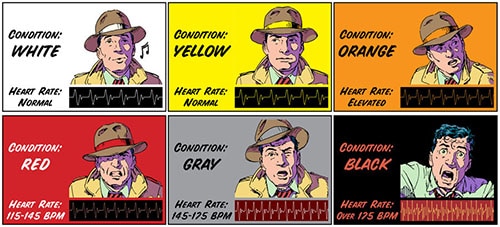
This article series is now available as a professionally formatted, distraction free paperback or ebook to read offline at your leisure.
Editor’s note: This article was originally published August 30, 2012. It has since been updated.
Whenever we look back on the past, our minds have a tendency to cast things in a warm, rosy glow – our memories invariably focus on the good parts and gloss over the bad. Which is why, when those who are removed a few years from their college days reminisce about that time, all they typically remember are the parties, the girls, the spring breaks, and so on.
What they forget . . . is the stress.
The stress of both holding down a job and being a student, the stress of stretching a meager budget each month, the stress of breaking up with someone you thought you’d spend your life with, the stress of fighting with a roommate who was once your best friend and is now your sworn enemy, and of course, the stress of cranking out a 20-page research paper and struggling to remember chemistry formulas on your final exams.
Make no mistake about it: the life of a young man is often quite glorious and free, but there will also be times when you feel utterly overwhelmed. Sure, a lot of adults tend to scoff at a young man’s stress — “You think you’re busy now? Wait until you have a wife, three kids, and a full-time job!” And these men are right, in a way – your total amount of stress will tend to increase as you age and take on more responsibilities, and you’ll probably look back on college and think, “What the heck was I so worried about?” But it’s all relative, isn’t it? The stress of a young man is both unique (I wouldn’t trade the pressure of a real job for being tested on my ability to regurgitate information again) and new – you haven’t yet accumulated the life experiences that will help you see that what feels like the end of the world now, is just another bump in the road.
All of which is to say, the stress you will experience after leaving home is real, and learning how to deal with it is one of the most important skills a young man can master. Since it is true that your stress will likely increase with age, learning how to manage it now will prepare you to live happily and confidently not just into your 20s, but for the rest of your life as well.
With that truth in mind, today we take you through a comprehensive primer designed to help you understand what stress is, how it can negatively affect both body and mind, and how you can easily and effectively manage it.
What is Stress?

Stress is your body’s reaction to circumstances in which it feels it needs more strength, stamina, and alertness in order to survive and thrive. Any perceived challenge or threat to your well-being can induce a stress response. This response signals your nervous system to release the hormones adrenaline, noradrenaline, and cortisol into your bloodstream, which gets you revved up and ready for action: your heart rate, blood pressure, sweating, and breathing increase, your blood vessels dilate to speed blood flow to your muscles, your pupils dilate to enhance your vision, and your liver releases stored glucose for your body to use as energy. In primitive times, this so-called “fight or flight” response instantly primed your body to deal with danger.
Thus, while many people view stress as an exclusively bad thing, it can in fact be either positive or negative. In the face of an immediate challenge — a job interview, a big presentation, a difficult test – the stress response puts you on your toes and can improve your performance and ability to handle the pressure. It also lends excitement to life; when you feel nervous butterflies before asking a girl out, or getting on a roller coaster, that’s stress too. It might seem like a 100% stress-free life would be incredible, but after a while, a state of perpetual calm would begin to feel flat, stale, and boring (at least for those of us who have not achieved total Zen!).
Stress only becomes a problem in the face of two main factors:
1. The first is stress overload. The amount of stress you feel given a certain set of circumstances is directly proportional to the degree in which you feel your skills and resources (including time) are adequate in addressing them. This state of competence can be based on either reality or one’s own optimistically or pessimistically rendered self-assessment. A man who enjoys and is talented at public speaking will feel much less stress before making a presentation than a man who is shy and speaks awkwardly; a man who completes an assignment over the course of a week will feel much less stressed than the man who waits to work on it until the night before; a man who is much less confident in dating women and what he has to offer them, will feel much more devastated when a girl dumps him than a man who has little doubt he’ll soon meet someone else. Instead of getting us revved up for action, stress that seems too big to handle can feel crushing, leaving us feeling overwhelmed and too paralyzed to do anything at all.
2. The second instance stress becomes a problem is when the set of circumstances causing it becomes chronic. The stress response was originally designed to help humans deal with immediate threats and challenges – after the adrenaline rush, our nervous systems quickly returned to stand-by mode in preparation for the next challenge. Saber-toothed tiger! Throw spear! Tiger dead! Whoo, relax time. Me go back to making cave paintings. But in modern times, our stressors can go on and on and on. As much as we might like to, we can’t spear our annoying roommate or co-worker. Instead, we have to put up with him day after day. And day after day, this chronic stress causes our bodies to dump out low levels of stress hormones. Unfortunately, a steady of dose of something that was supposed to be rare and fleeting can make us physically and emotionally sick.
The Damaging Effects of Too Much Stress
Too much stress can do a number on both your body and mind, causing everything from diarrhea and constipation, to tension headaches and hair loss. Below we describe more of the deleterious effects of stress:
1. Weight gain. At the height of your stress response, you will likely experience a decreased appetite. But once the stress starts to wane, the cortisol that was released into your bloodstream may spur you to eat sugary, carbohydrate-rich foods. This made sense back in primitive times: the fight or flight response usually preceded a bout of physical exertion (get that mammoth!), and after the stress had passed, it was time to replenish your body. These days, when you may experience the stress response while remaining chained to your desk, gobbling down donuts as you descend from your stress peak will only lead to a primordial-sized gut.
2. Decreased libido and erectile dysfunction. Cortisol also decreases testosterone production, which in turn can depress a man’s libido and cause erectile dysfunction. If you want to enjoy a healthy sex drive in adulthood, you’ll need to get a handle on your stress today.
3. Increased blood pressure. Cortisol, along with the other hormones that are released when we’re stressed, causes our hearts to beat faster and constrict our blood vessels in order to prime our bodies for fight or flight. Fine in the short term, but prolonged stress can lead to hypertension, and all its attending health problems.
4. Insomnia. With cortisol still pumping through your veins, even after the height of a stressful experience has passed, you may find yourself still too revved up to sleep. This inability to get some shuteye is often compounded by other factors that frequently attend stressful times — caffeine consumption, and racing, worried thoughts.
5. Hyper-emotionality. When you’re stressed and your willpower is depleted, you become more emotional. Hyper-emotionality doesn’t necessarily mean that you’ll become a blubbering mess at a drop of the hat, though that is a common response of individuals who are over-stressed. Rather it means that all your emotions — sadness, anger, even happiness — are in overdrive. With the rational part of your brain no longer in control, you’re more susceptible to outbursts of all kinds.
6. Social isolation. A common response to stress is to retreat to our “bunker” and isolate ourselves from other people. As we’ll discuss further down, while it’s certainly okay to get some alone time when you’re feeling stressed, too much isolation can actually contribute to your anxiety.
7. Poor concentration and memory. While some stress can make us more mentally nimble, chronic stress depletes our willpower and turns us into dolts. Studies show that individuals who experience stress over a long period of time demonstrate poorer concentration, decreased memory, and a reduced decision making capacity.
8. Fatigue. According to the American Psychological Association, 25% of men report experiencing physical and mental fatigue several times a week. Stress is one of the biggest contributors to that tuckered out condition. Physical tension and mental worry, along with a diminishment in testosterone, drains our bodies and makes us feel sluggish and tired.
9. Weakened immune system. You may have heard that all stress is bad for your immune system, but recent studies have shown that short bursts of stress can actually boost it. When your mind senses a coming crisis, stress hormones muster immune cells to potential “battlefields” in the body — tissues, organs, and mucous membranes that are particularly sensitive to infection. In primitive times, the fight of flight response was typically triggered in situations like hunting or combat where physical wounds were a likely outcome, and these immunity “soldiers” stood at the ready to stave off infection and heal these wounds as soon as they formed. But, once again, a response that was beneficial a thousand years ago has been hijacked by the ongoing stress of modern life. The constant drilling of your immunity troops in preparation for a non-existent emergency eventually wearies and weakens them, leaving you vulnerable to infections and inflammation.
10. Depression. Chronic stress reduces neurotransmitters in the brain like serotonin and dopamine, which help regulate things like appetite, energy, and sleep, in addition to balancing our moods and contributing to our sense of well-being. A diminishment of these neurotransmitters can cause depression directly, but can lead to it indirectly as well by creating a circular pattern of negative behavior. You have trouble sleeping, so you don’t feel like exercising in the morning, which makes you feel more stressed out, so you eat more, which makes you feel more sluggish, which makes you not want to go out and socialize…and on the circle spirals, potentially into depression.
11. Increased alcohol consumption, smoking, and drug use. Men tend to deal with stress by looking for an escape from it. Oftentimes, that escape is alcohol, smoking, and drugs. While many a well-balanced man won’t experience any ill-effects from a nightcap to take the edge off a stressful day, it becomes a problem when one glass turns to four. Heavy alcohol or drug use can lead to a whole host of relationship and health problems, and does nothing to mitigate the source of the stress — it may actually exacerbate it.
How to Manage Stress Effectively
Reading over all those stress-induced maladies may have left you feeling stressed about being stressed! But don’t worry: most stress is very manageable as long as you commit to doing the small, daily maintenance tasks that will keep your stress from reaching the point where it begins to feel crushing.
As we mentioned above in the “What is Stress?” section, negative stress is generally the result of two factors: 1) Not feeling like our skills, talents, and resources (including time) are adequate to handle a threat or challenge, and 2) Chronic stress-producing circumstances that last for days, weeks, even years.
Thus, when it comes to managing stress, you need to take a double-pronged approach that includes preventing these factors from occurring in the first place, and learning how to mitigate them when prevention is impossible.
1. Develop your resiliency. A huge part of dealing with stress has nothing to do with the actual stressor, but how you handle that stressor.A situation one man navigates with confident ease can cause another man to completely fall apart. Thus, the foundational block in your ability to manage stress is developing the trait of resiliency. Being resilient encompasses the way in which you both act and react in the world — your ability to both quickly bounce back from challenges and trials and to face the world head-on with courage and confidence. Without a resilient attitude and approach to life, all of the stress-reducing methods below amount to rearranging the deck chairs on the Titanic.
The path to developing resilience cannot be explained in just a few sentences. Luckily, a couple of years ago, we wrote a comprehensive, 7-part series on the subject. It includes both a conceptual framework to help you understand the nature of resilience as well as practical methods to develop the trait. I really believe it’s a must-read for a man of any age. You can find the series here, and we also put together the articles in an ebook that includes worksheets as well. When it comes to dealing with stress, the articles on Avoiding Learned Helplessness and Changing Your Explanatory Style, Taking Control of Your Life, and How to Quit Catastrophizing will be most applicable and helpful.
2. Exercise. If you take only one stress-reducing strategy from this list, let it be this: make exercise a regular habit. Researchers have found that exercise is just as effective as antidepressants in treating clinical depression and increases the levels of endocannabinoid molecules in our blood, the same endocannabinoids that are responsible for the calming pleasure produced by the consumption of marijuana.
Exercise not only treats stress, it may also help prevent it as well; preliminary studies are beginning to show that the small amount of physical and mental stress you experience when you exercise acts sort of like an inoculation to high-stress events later, creating brain cells that are better able to deal with anxiety, or in other words, a more stress-resistant brain. If you need help in starting a regular exercise routine, we offered some tips on the subject last week.
To make your exercise doubly-effective, do your workout outside, for the reasons we’ll explain next.

3. Get out in nature. In nature, body and mind get a chance to rejuvenate. In a study done in Japan, researchers found that after a 20-minute walk in the forest, participants had “lower concentrations of cortisol, lower pulse rate, lower blood pressure, greater parasympathetic nerve activity, and lower sympathetic nerve activity” than subjects who spent time in the city. In layman’s terms? Walking in the woods mellows you out. In a follow-up study, time spent in nature increased feelings of vigor and decreased the feelings of anger, anxiety, and depression.
So instead of spending every Saturday sacked out on the couch watching football, start making time for regular hikes in the woods. Your inner-Thoreau will thank you.
4. Meditate. Numerous studies have shown that simple mindfulness meditation can reduce and even eliminate many of the negative physiological and psychological symptoms of chronic stress. While you’re meditating, blood pressure normalizes, breathing and heart rate slows, and your adrenal glands produce less cortisol. Participants in meditation studies often report lower anxiety, worry, and tension levels. Moreover, regular meditation actually rewires your brain and makes you more resilient in the face of stress.
Never meditated? Just read our quick and handy how-to guide to get started. The beauty of it is that you don’t even have to meditate that long to get the benefits. Just 20 minutes a day will do the trick, and you’ll start noticing the benefits in just a few weeks.
5. Make a list of what’s stressing you out. Sometimes when we have a bunch of things that are worrying us and a long list of things to do, all of these stressors swirl together in a big cloud of restlessness and agitation. We feel overwhelmed, but the cloud makes it hard for us to even articulate exactly why. When this happens, take some time to make a list of everything you’re worried about. Offloading them from your brain to paper will help your cranium to relax. This is, in fact, one of the things Dwight D. Eisenhower did to relieve his stress when the burden of deciding when to launch D-Day grew crushingly heavy.
Now, make an action/to-do list by looking at each item on your worry list. Write down small, specific, immediate things you can do to take care of each stressor.
6. Get plenty of sleep. Sleep and stress create somewhat of a Catch-22 problem. Our bodies and minds need sleep to help manage and cope with stress, but stress can oftentimes prevent us from getting the sleep we need! While we could devote an entire post to how to improve your slumber, here are a few quick things you can do to get the best night’s sleep possible, even when you’re feeling tense:
- Meditate twenty minutes before hitting the sack to calm and relax your mind and body.
- Write down all your worries before getting into bed so you’re not thinking about them while you’re trying to get to sleep. As we just mentioned, this is an effective stress-reducing tactic anytime, but it’s particularly effective right before bed.
- Turn off the computer and TV an hour before going to bed. The light from electronic screens suppresses the body’s natural melatonin production, a hormone which helps lull you into sleep.
- Speaking of melatonin, consider taking a melatonin supplement right before going to bed. It can help you relax and get to sleep quicker (and based on my experience, have crazy dreams).
- Make sure your room is nice and cool. Studies show the optimal temperature for sleep is somewhere between 60 to 68 degrees (brrrr!). If you don’t want to run the A/C that low all night, get a fan, keep your sleepwear light (or nonexistent), and don’t use heavy blankets or comforters.
- Play some white noise. White noise blocks distracting sounds as well as provides a relaxing sound that will soothe you into sleep. This can particularly help if you have night owl roommates who stay up and make noise after you’ve turned in, or if you live in the heart of a noisy city. A desktop fan is a great white noise source. Or you can download white noise soundtracks to play while you’re sleeping. I used this free white noise generator while in law school for my power naps, speaking of which…

6. Take a nap. The simple nap is a powerful thing that offers a whole host of amazing benefits, including increased alertness, a boost in your learning and working memory, and greater creativity. It’s also a potent stress-fighter: napping releases growth hormones and serotonin, which balances your cortisol, soothes your stabbiness, and leaves you feeling content and rejuvenated.
8. Reduce caffeine consumption. Caffeine increases cortisol and adrenaline production in your body, which may make you feel better in the short-term, but will increase your jagged, stressed-out feeling in the long-term. Cut back on caffeine and try to avoid it after 2PM to ensure you get a good night’s sleep.
9. Stick to a routine. The more out of control you feel, the more stressed out you’ll be. While we can’t control everything that happens to us during the day, by taking charge of the things we can control, we can greatly reduce our anxiety. One way to feel more in control of your life is by establishing and sticking to routines: exercise routines, morning and evening routines, work routines. Anything you do frequently, try to make it routine. The more your mind knows what to expect next, the more calm and confident it will feel.
10. Plan your week. Much of the stress I experienced in college was created because I didn’t manage my time well. I’d forget due dates, wait until the last minute to write a paper, and schedule appointments that conflicted with other obligations. When I started planning my week, things markedly improved. Having a weekly plan will ensure you don’t forget important stuff or overextend your commitments like I did. Moreover, having a plan makes you feel in control, which as we just discussed, keeps stress at bay.

11. Get social. As I mentioned above, a common response to stress (especially for us men) is to become a hermit. I’m that way. Sometimes I just need to be alone so I can sort through stuff. While it’s perfectly fine and healthy to get some alone time when you’re stressed, if you’re still feeling frazzled after some solitude, call up a buddy or two to hang out. Studies show that social interaction does wonders for reducing stress. Our bodies release anti-stress, feel-good hormones like oxytocin when we’re around people who care for us. Plus, friends and family can offer some much needed advice and perspective that can help you manage and sort through whatever’s burdening you; while you should strive to be self-reliant as much as possible, there’s no shame in calling up mom and dad when you’ve reached the end of your rope.
12. One bird at a time. I read a book a few years ago about writing by Anne Lamont that had some advice that I think is applicable to managing stress effectively. From the book Bird by Bird:
“Thirty years ago my older brother, who was ten years old at the time, was trying to get a report on birds written that he’d had three months to write. [It] was due the next day. We were out at our family cabin in Bolinas, and he was at the kitchen table close to tears, surrounded by binder paper and pencils and unopened books on birds, immobilized by the hugeness of the task ahead. Then my father sat down beside him, put his arm around my brother’s shoulder, and said. ‘Bird by bird, buddy. Just take it bird by bird.'”
When you’re feeling overwhelmed and stressed by the things that are piling up, just take them “one bird at a time.” Instead of focusing on the enormity of everything you have to do, break things up into their component parts and do one thing at a time until you’re done. Concentrate on simply putting one foot in front of the other.
13. It will get done and over with. Something that helps me when I’m stressed out to the point where it feels like the world is going to end, is simply to tell myself, “It will get done and will be over with.” Maybe you’ll have to stay up all night to finish it, maybe what you turn in won’t be as good as it could have been, but regardless of what happens, that due date or scheduled meeting will come and go, you’ll accept the consequences, and life will move on. You can look at the clock, and think “Okay, at 3:00 pm tomorrow, this will be resolved one way or another.” For whatever reason, thinking this helps me settle down and get going on whatever I can do.
14. Start saying “NO.” A big source of stress in my life has been over-committing myself. I’d say “yes” to just about anything because, 1) I’m sort of a people pleaser, and 2) I didn’t want to miss out on any opportunity that might further my goals. After enduring the stress of managing an overbooked schedule one time too many, I’ve had to learn to say “no.” Don’t be like me. Don’t should on yourself, and learn how to say “no” early on in your adult life.
If You’re Feeling Overwhelmed, Get Help
If you’re still feeling overwhelmed after doing all that you can to manage your stress on your own, seek professional help immediately from a school counselor or therapist. Reaching out for help, especially for emotional or psychological problems, is hard for men to do. It requires us to talk about emotions and be vulnerable. Plus, we often view getting help as a sign of weakness.
If you feel like you’re headed off to the deep end because of stress, don’t let the fear of looking “unmanly” keep you from getting the help you need. Men experiencing depression or chronic stress are much more likely than women to abuse alcohol, resort to violence, or attempt suicide. A trained counselor or therapist can walk you through ways to cope with your stress that don’t involve harming yourself or others.
If you’re at college, go visit the student support center. They should have trained counselors that you can talk to confidentially, for free.
If you’re not in college, but can’t afford a therapist, try these affordable options as suggested by Everyday Health:
- Community mental health centers. Most states and cities have agencies that provide mental health services with trained therapists at a reduced rate. To find a community health center near you, simply Google the name of your city + “community mental health center.”
- Non-profit mental health organizations. Two non-profit groups – National Alliance of Mental Illness and Mental Health America – have chapters throughout the country that provide affordable individual and group therapy. Visit their respective websites and find a chapter near you.
- College psychology and therapy departments. Visit your local college campus to see if they provide discounted mental health services to the public. Many psychology and therapy departments have clinics staffed by graduate students that work with patients under the close supervision of faculty members.
- Group therapy. Group therapy is usually much more affordable than one-on-one therapy. Do a Google search to find group therapy sessions near you that focus on stress and anxiety issues.
Be sure to listen to our podcast on stress-proofing your brain and body:
<







